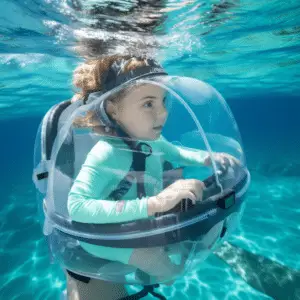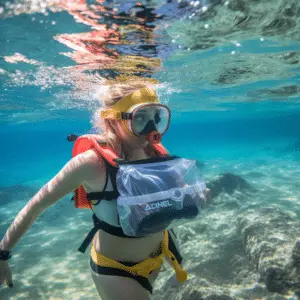When you are pregnant, there are a lot of limitations in your life that you may not have experienced before. You essentially hear that you can’t perform all the enjoyable activities, like drinking or eating eggs. You may feel as though you have been forced prohibited from engaging in aquatic sports for the subsequent nine months if you prefer them. While not always true for other water sports, you should absolutely stay away from scuba diving. As long as you are pregnant, you won’t be scuba diving in Cozumel any time soon. If you are someone who is an avid snorkeller that enjoys exploring the wonders of the ocean, then you may be in luck. You can still enjoy one of your favorite sports, but only if you follow some important rules.
Assess your own fitness

Pregnancy affects everyone in different ways. Some people continue to feel very active and mobile during their pregnancy, but some people encounter a number of health issues that mean they can’t be as mobile as they once were. If you are someone who has experience in snorkeling, you will be very aware that your physical fitness needs to be good to be able to enjoy snorkeling. That’s because snorkeling obviously consists of a lot of swimming and physical movement and pregnancy can sometimes restrict your ability to be physical. It is recommended that before you try to take the leap into snorkeling, you should first spend the afternoon at a swimming pool. This will give you an idea of how much stamina you have and if it will be appropriate for you to take up snorkeling again.
Do not snorkel alone
If you find that you do in fact wish to take to the water, it is essential that you do not do it alone. Both pregnancy and snorkeling can be incredibly unpredictable on their own, so imagine how unpredictable they can be together. At any point during a pregnancy, there can be complications with the baby or issues with your own body. The same can be said when it comes to snorkeling, it is really easy for things to go wrong, even for the more experienced snorkeller. Because of this, it is incredibly important that you snorkel with at least one other person. This way, if anything goes wrong, you have someone by your side to support you and help you get to the water.
Though we recommend that you snorkel with at least one other person, you really need to be snorkeling with a full team if you are pregnant. Though some snorkeling groups may be hesitant when it comes to snorkeling with a pregnant lady, plenty of companies have special training for dealing with a pregnant snorkeller and encourage women to pursue their passions, even when they are with child. It may take a bit of digging, but you will find a company that will allow you to snorkel with a group. However, if you can’t find a team, you can always snorkel with a group of experienced friends.
Absolutely no freediving
Despite your past freediving experience, you should not freedive while pregnant. You should avoid depriving your infant of oxygen because they need it constantly. No matter how tempting, free diving is risky. Pregnancy makes it harder to hold your breath, therefore your freediving time is very short.
With this, you should also make sure that you can comfortably breathe with your snorkel on. It is recommended that you test whether or not you can breathe through your snorkel before you enter the water as it is better to know when you’re safe than find out when you’re already submerged.
Cover up
If you have experience with snorkeling, you will be more than aware of just how easy it is to fall victim to sunburn. Though sunburn isn’t exactly going to kill you, it can be extremely painful and hard to deal with, especially if you are already dealing with the hassle of carrying a baby. You may not have to do it if you are snorkeling in a cave vs cavern as you won’t be in direct contact with the sun. Protecting oneself from sunburn and scrapes and scratches is vital. Snorkeling is risky because coral and other sharp things can catch you. Pregnant women are susceptible to infection and shock, which is dangerous for babies. Covering up will protect you and the baby.
Protecting yourself from sunburn and scrapes and scratches is important. Snorkeling is dangerous because coral and other sharp items can catch you. Pregnant women are susceptible to infection and shock, which is bad for newborns. Covering up will protect you and the baby.
Make sure the equipment is sanitized
If you can, you should use your own equipment when snorkeling. If you are someone that doesn’t own their own gear, then you may choose to rent it from whatever snorkeling company that you are working with. The issue with some snorkeling companies is that they don’t properly disinfect their equipment all of the time. Hundreds of different people may use this equipment and so by using that equipment yourself, you are exposing yourself to a vast amount of bacteria. People who use the equipment may also have illnesses that you will not want to catch if you are pregnant. The most important task that you have when you are pregnant is ensuring that you are healthy. Any illness that you may catch could strain your baby and cause stress, which could cause complications in your pregnancy.
Don’t push yourself
It is understandable to be frustrated with the restrictions you are constantly under during pregnancy. After all, you have a team of people telling you what you can and can’t do, which is understandably annoying. Because of this, a lot of pregnant women have the habit of pushing it a bit too far to prove that they are not completely incapable of basic activities that they once did easily. However, you really shouldn’t push yourself too much when you are snorkeling while pregnant. Snorkeling is already such a demanding activity, even when you aren’t pregnant and so you should really take it easy and try not to push yourself past your own limits. Again, you should do everything you can to ensure that your baby doesn’t experience stress, and straining your body will cause stress.
Stay shallow
Even though you may be tempted to snorkel in deep waters, be sure to stay in shallow waters. This is a much safer option as with shallow water there aren’t many risks. There is also more visibility within shallow waters, which means if you find yourself in a position of difficulty, someone else that you are snorkeling with will be able to notice you struggling. There is also far less stress when snorkeling in shallow water and fewer safety concerns to take into consideration.
Be aware

Ultimately the best thing you can do to ensure your safety when snorkeling is to be aware. Make sure that all your equipment is working correctly, be sure that the water is safe, and also make sure that you’re feeling ok.
